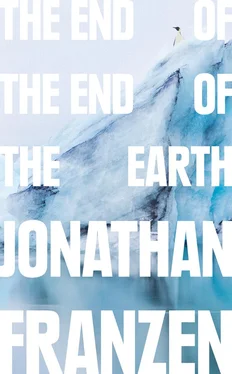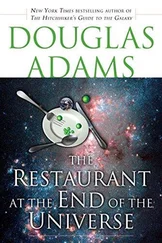But birds also do the thing we all wish we could do but can’t, except in dreams: they fly. Eagles effortlessly ride thermals; hummingbirds pause in midair; quail burst into flight heart-stoppingly. Taken in sum, the flight paths of birds bind the planet together like a hundred billion filaments, tree to tree and continent to continent. There was never a time when the world seemed large to them. After breeding, a European swift will stay aloft for nearly a year, flying to sub-Saharan Africa and back, eating and molting and sleeping on the wing, without landing once. Young albatrosses spend as many as ten years roving the open ocean before they first return to land to breed. A Bar-tailed Godwit has been tracked flying nonstop from Alaska to New Zealand, 7,264 miles in nine days, while a Ruby-throated Hummingbird may burn up a third of its tiny body weight to cross the Gulf of Mexico. The Red Knot, a small shorebird species, makes annual round-trips between Tierra del Fuego and the Canadian Arctic; one long-lived individual, named B95 (for the tag on its leg), has flown more miles than separate the Earth and the moon.
There is, however, one critical ability that human beings have and birds do not: mastery of their environment. Birds can’t protect wetlands, can’t manage a fishery, can’t air-condition their nests. They have only the instincts and the physical abilities that evolution has bequeathed them. These have served them well for a very long time, 150 million years longer than human beings have been around. But now human beings are changing the planet—its surface, its climate, its oceans—too quickly for birds to adapt by evolving. Crows and gulls may thrive at our garbage dumps, blackbirds and cowbirds at our feedlots, robins and bulbuls in our city parks. But the future of most bird species depends on our commitment to preserving them. Are they valuable enough for us to make the effort?

Value, in the late Anthropocene, has come almost exclusively to mean economic value, utility to human beings. And, certainly, many wild birds are usefully edible. Some of them in turn eat noxious insects and rodents. Many others perform vital roles—pollinating plants, spreading seeds, serving as food for mammalian predators—in ecosystems whose continuing wildness has touristic or carbon-sequestering value. You may also hear it argued that bird populations function, like the proverbial coal-mine canary, as important indicators of ecological health. But do we really need the absence of birds to tell us when a marsh is severely polluted, a forest slashed and burned, or a fishery destroyed? The sad fact is that wild birds, in themselves, will never pull their weight in the human economy. They want to eat our blueberries.
What bird populations do usefully indicate the health of is our ethical values. One reason that wild birds matter—ought to matter—is that they are our last, best connection to a natural world that is otherwise receding. They’re the most vivid and widespread representatives of the Earth as it was before people arrived on it. They share descent with the largest animals ever to walk on land: the house finch outside your window is a tiny and beautifully adapted living dinosaur. A duck on your local pond looks and sounds very much like a duck twenty million years ago, in the Miocene epoch, when birds ruled the planet. In an ever more artificial world, where featherless drones fill the air and Angry Birds can be simulated on our phones, we may see no reasonable need to cherish and support the former rulers of the natural realm. But is economic calculation our highest standard? After Shakespeare’s King Lear steps down from the throne, he pleads with his elder two daughters to grant him some vestige of his former majesty. When the daughters reply that they don’t see the need for it, the old king bursts out: “O, reason not the need!” To consign birds to oblivion is to forget what we’re the children of.
A person who says, “It’s too bad about the birds, but human beings come first” is making one of two implicit claims. The person may mean that human beings are no better than any other animal—that our fundamentally self-centered selves, which are motivated by selfish genes, will always do whatever it takes to replicate our genes and maximize our pleasure, the nonhuman world be damned. This is the view of cynical realists, to whom a concern for other species is merely an annoying form of sentimentality. It’s a view that can’t be disproved, and it’s available to anyone who doesn’t mind admitting that he or she is hopelessly selfish.
But “human beings come first” may also have the opposite meaning: that our species is uniquely worthy of monopolizing the world’s resources because we are not like other animals; because we have consciousness and free will, the capacity to remember our pasts and shape our futures. This opposing view can be found among both religious believers and secular humanists, and it, too, is neither provably true nor provably false. But it does raise the question: if we’re incomparably more worthy than other animals, shouldn’t our ability to discern right from wrong, and to knowingly sacrifice some small fraction of our convenience for a larger good, make us more susceptible to the claims of nature, rather than less? Doesn’t a unique ability carry with it a unique responsibility?
If you stand in a forest in Southeast Asia, you may hear and then begin to feel, in your chest, a deep rhythmic whooshing. It sounds meteorological, but it’s the wingbeats of Great Hornbills flying in to land in a fruiting tree. They have massive yellow bills and hefty white thighs; they look like a cross between a toucan and a giant panda. As they clamber around in the tree, placidly eating fruit, you may find yourself crying out with the rarest of all emotions: pure joy. It has nothing to do with what you want or what you possess. It’s the sheer gorgeous fact of the Great Hornbill, which couldn’t care less about you.
The radical otherness of birds is integral to their beauty and their value. They are always among us but never of us. They’re the other world-dominating animals that evolution has produced, and their indifference to us ought to serve as a chastening reminder that we’re not the measure of all things. The stories we tell about the past and imagine for the future are mental constructions that birds can do without. Birds live squarely in the present. And at present, although our cats and our windows and our pesticides kill billions of them every year, and although some species, particularly on oceanic islands, have been lost forever, their world is still very much alive. In every corner of the globe, in nests as small as walnuts or as large as haystacks, chicks are pecking through their shells and into the light.
Last September, as someone who cares more about birds than the next man, I was following the story of the new stadium the Twin Cities are building for their football Vikings. The stadium’s glass walls were expected to kill thousands of birds every year, and local bird lovers had asked its sponsors to use a specially patterned glass to reduce collisions; the glass would have raised the stadium’s cost by one-tenth of one percent, and the sponsors had balked. Around the same time, the National Audubon Society issued a press release declaring climate change “the greatest threat” to American birds and warning that “nearly half” of North America’s bird species were at risk of losing their habitats by 2080. Audubon’s announcement was credulously retransmitted by national and local media, including the Minneapolis Star Tribune , whose blogger on bird-related subjects, Jim Williams, drew the inevitable inference: Why argue about stadium glass when the real threat to birds was climate change? In comparison, Williams said, a few thousand bird deaths would be “nothing.”
Читать дальше













